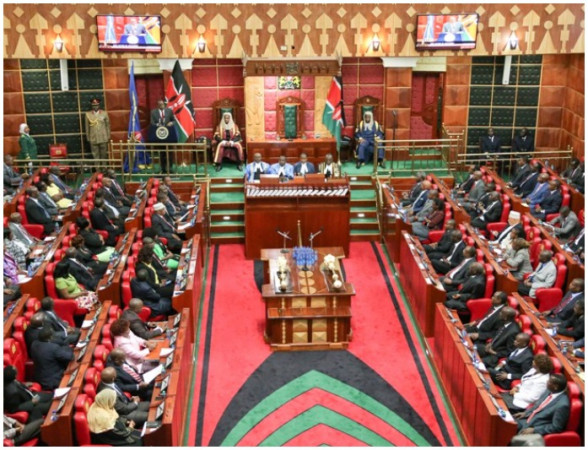Lawmakers propose tough penalties for graft suspects

Public officers suspected of engaging in corrupt deals and those under investigation will now be blocked from accessing their offices if MPs pass amendments to two anti-corruption laws.
Individuals with integrity questions will also be barred from seeking any elective and appointive positions in what is likely to cause an uproar among hundreds of politicians who have been cleared by the electoral agency to vie in the August 9 General Election.
The government, in the Statute Law (Miscellaneous Amendments) Bill 2022 sponsored by National Assembly Majority Leader Amos Kimunya seeks to amend the Anti-Corruption and Economic Crimes Act, 2003 and the Leadership and Integrity Act 2012 to effectively fight the vice.
For instance, the omnibus bill proposes to amend the Anti-Corruption and Economic Crimes Act to allow the commission to seek court orders to bar a state officer from accessing their office or exercising powers of that office where the public officer is likely to interfere with investigations in any way.
Criminal offences
The Bill scraps provisions of Section 62(6) of the Act which shields state officers from stepping aside even if charged with a criminal offence.
“Notwithstanding the provisions of any other law, where a state officer is under investigations for or has been charged with corruption or economic crime may by an ex parte (without officer’s knowledge) application in the High Court, seek for an order from accessing her/his office,” the Bill states.
Such an officer, the Bill states, will also be barred from exercising powers of that office where the officer is likely to interfere with investigations in any way.
The bill states that should EACC upon preliminary investigations establish grounds to reasonably suspect that the public or state officer is likely to conceal, alter, destroy or remove records, documents or other evidence or is likely to intimidate, threaten or otherwise interfere with the witnesses or interfere with investigations in any other manner, such officer should be barred from accessing their office or exercising the powers vested upon that office.
The bill seeks to legislate High Court Judge Mumbi Ngugi’s landmark ruling that barred governors charged with corruption or criminal offences from accessing their offices.
Justice Ngugi, who has since been elevated to the appellate court, declared a section of the law protecting graft suspects untenable and unconstitutional.
She termed Section 62(6) of the Anti-Corruption and Economic Crimes Act which state officers have been using to remain in office as “entrenching corruption and impunity in the land.”
State officers
She ruled that the state officers can only access their offices with written permission from the EACC. The ruling affected county bosses including former Kiambu Governor Ferdinand Waititu, Mike Sonko (Nairobi) and Okoth Obado (Migori ).
Garissa Governor Ali Korane was also barred from accessing his office after he was charged with mismanaging Sh233 million in county funds.
The bill also seeks to amend the Leadership and Integrity Act and empowers the Ethics and Anti-Corruption Commission (EACC) to advise a recruiting entity or appointing authority to take into account the recommendations on the integrity and suitability of the candidates in making appointment decisions.
“The High Court may upon application by any person, declare the assumption of office by a state officer to be invalid, for want of executing a commitment to the specific leadership and integrity code,” the bill reads.
State officers here include deputy president, governors, MPs, judges and holders of independent offices.
Questionable funds
Kenya’s National Integrity Alliance recently urged the Independent Electoral and Boundaries Commission (IEBC) to refrain from clearing 25 political aspirants with questionable integrity to run for elective positions.
Similarly, EACC in a memo to the electoral commission also warned the electoral commission against clearing 241 aspirants for the polls over integrity issues.
Further, Interior Cabinet Secretary Dr Fred Matiang’i has severally expressed concern that an unusually high number of economic criminals and their accomplices may buy their way into Parliament and County Assemblies.
He said intelligence pointed to a possibility of up to 40 per cent of elective seats being won by criminals relying on bribery and questionable funds.
“If we are not careful as Kenyans, by the time we are done with this electoral cycle, we would’ve laundered criminals into our institutions.”
He added: “These include money launderers, “wash wash” players, drug dealers and others who can access large sums of money.”
Matiang’i warned that electing criminals will expose the country to bad laws and also make it hard to fight corruption.
The new Bill states that EACC may be triggered to seek a court order to bar an officer under investigation from accessing office if, upon preliminary investigations, establishes grounds that the public or state officer is likely to interfere with evidence.
This is in terms of concealing, altering, destroying or removing records, documents or any other evidence crucial in sustaining the case or aiding the investigations.
Currently, the EACC and DCI are actively investigating several states and public officers implicated in multi-million shilling graft cases.










